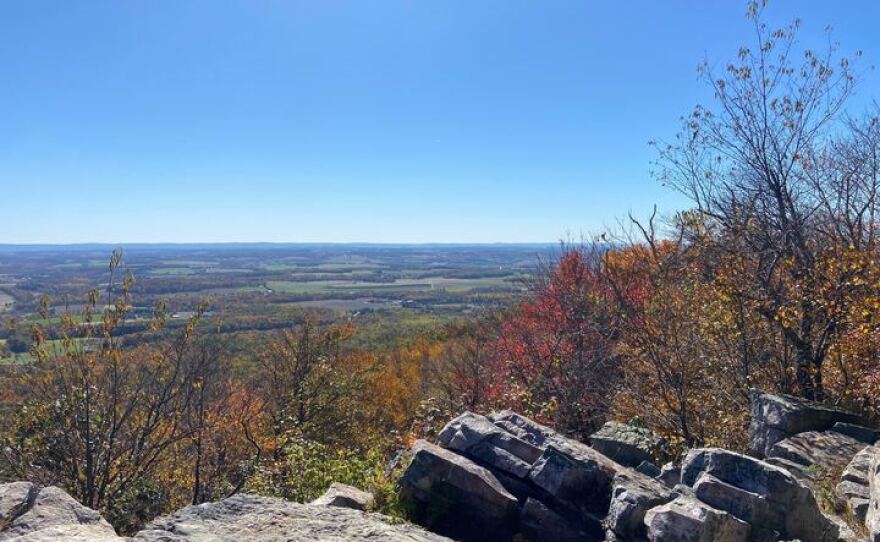- Peak fall foliage season in the Lehigh Valley is almost over
- As fallen leaves begin to pile up, environmental advocates say it’s better to “leave the leaves”
- Fallen leaves are used by many animals and insects as habitat or to find food
BETHLEHEM, Pa. — The leaves starting to cover lawns across the Lehigh Valley might seem like a nuisance, but many animals and insects use the leafy habitat to live or find food.
“For example, fireflies spend their larval lives in decomposing leaves, searching for prey,” said Muhlenberg College biology professor Marten Edwards. “It is very common to find salamanders frolicking under piles of leaves.
“Many birds make their living by looking for food in leaf litter.”
As peak fall foliage season in the Valley begins to fade and Mother Nature drops her confetti, residents and commercial landscapers will be working to clear lawns and roadways. While the noise and air pollution caused by gas-powered lawn equipment is well documented, there are additional reasons to “leave the leaves,” environmental advocates said — reducing waste headed to landfills, as well as protecting habitat for native animals and insects.
In 2018, yard trimmings generated 35.4 million tons of municipal solid waste across the U.S., making up 12% of all waste, according to the Environmental Protection Agency. That same year, landfills received about 10.5 million tons of yard trimmings, just over 7% of all waste landfilled.
In Pennsylvania, yard trimmings, food scraps and other organics make up about 34% of municipal waste landfilled, according to the state Department of Environmental Protection.
Leaf litter is “teeming with life,” according to Penn State’s College of Agricultural Sciences.
"Microbes get to work, breaking down the organic matter into smaller and smaller pieces which can then be consumed and excreted by a number of organisms such as wood lice, millipedes, snails, fly larvae and earthworms."Penn State’s College of Agricultural Sciences
“Microbes get to work, breaking down the organic matter into smaller and smaller pieces which can then be consumed and excreted by a number of organisms such as wood lice, millipedes, snails, fly larvae and earthworms,” according to researchers. “This is called decomposition, where nitrogen is recycled from leaves back into the soil for plants to take up through their roots.
“Removing leaf litter eliminates this natural source of nutrients that moves its way through the entire food web.”
Fallen leaves serve as shelter, hibernating or overwintering habitat for beetles, walking sticks, the nine-spotted ladybug and the hummingbird moth, according to Penn State. Also, butterflies, like the eastern tiger swallowtail, question mark, mourning cloak and Milbert’s tortoiseshell, all make use of fallen leaves.
While residents don’t have to throw out their rake — though cutting back on the leaf blower will make the neighbors happier, Edwards said — there are ways to compromise.
Here's LehighValleyNews.com’s interview with Edwards. Some answers were edited for style and clarity.
Q: How do those insects/animals [that use fallen leaves for habitat] impact people?
A: A healthy environment is essential for human health and makes our lives better in innumerable ways. Pollinators provide essential services for flowering plants. Predatory insects keep insect pests under control. Fireflies remind us that magic is real. Birds make our lives more interesting.
Q: Do the leaves also serve plant life during decomposition?
A: Absolutely. Plants invest a lot of energy into making leaves, and leaves contain the nutrients that plants need to grow. Decomposing leaves return nutrients to the soil. In some cases, they can keep weeds under control, just like mulch that we have to buy at the hardware store.
Q: What are the benefits to leaving the leaves where they fall?
A: It depends on where they fall. It is good to keep them away from places we walk because they can be slippery. The grass may not grow under a thick layer of leaves. However, if you have a chance, a great compromise is to find a part of the yard where you can put the leaves.
A lawn mower can be used to mulch the leaves in place. I compost most of the leaves that fall at my house in the West End of Allentown. Many municipalities remove the leaves and compost them. If your community provides that service, it’s a great way to remove extra leaves you don’t have room to compost them yourself.
Q: When leaves are bagged and discarded, they generally end up in landfills, right?
A: Yes, and this makes me sad. Sometimes, people move to the city and don’t know that the city takes away the leaves and composts them free of any extra charge. Putting them in plastic bags is a huge waste of time and money.
All that plastic just ends up in the landfill — which costs the public money and helps nobody.
Q: Are there any downsides to leaving the leaves?
A: You want to keep the leaves off the sidewalk or places that you are likely to walk around in. You don't want leaves to clog your gutters or drains, either.
Apart from that, there are only benefits to taking advantage of the wonderful gifts we get from nature in the form of leaves!
Q: What should residents/businesses do when leaves start piling up? What do you do?
A: Invest in a rake. Raking leaves can be good cardiovascular exercise and save a trip to the gym. If you cannot rake leaves yourself, try to find someone happy to exchange their time and effort for payment, cookies or old-fashioned gratitude.
I confess to having one of those infernal leaf blowers. Guilty as charged, but I try to avoid using it, especially in the evenings and mornings when other people may be looking for peace and quiet.














